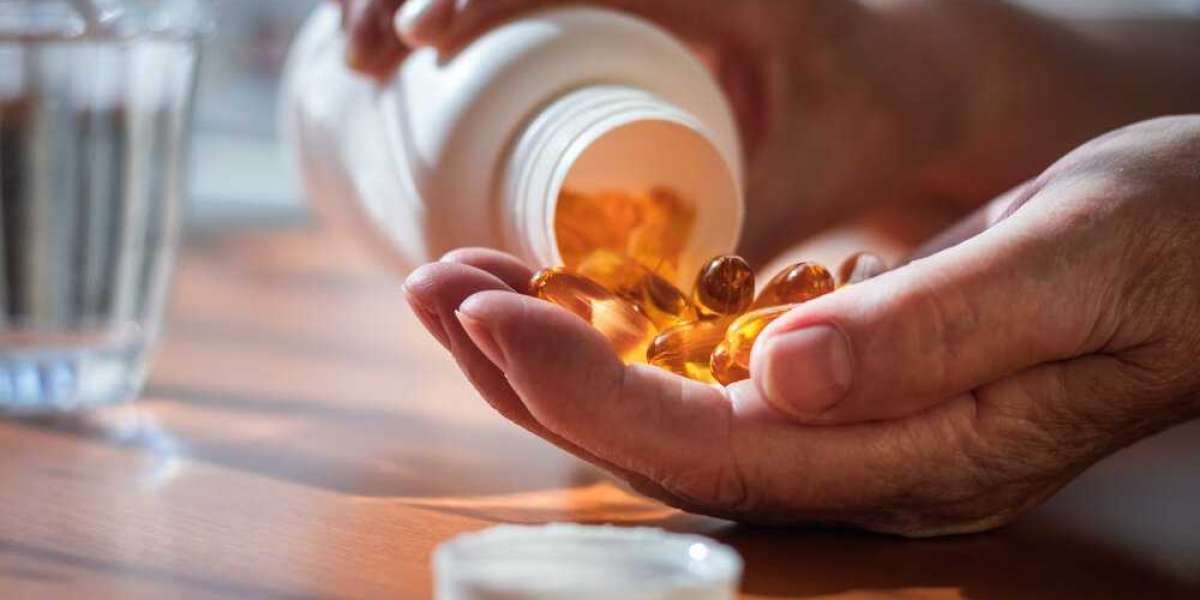You would get all of your nutrients from fruits, vegetables, and other unprocessed whole foods if you lived in the perfect world. However, as you approach your fifties, hormonal changes make meeting your recommended daily allowances of certain vitamins and minerals increasingly difficult. However, while science will never be able to replicate everything that nature has perfectly packaged into whole foods, supplementing your diet with these essential nutrients should help you stay on top of your game.
You're in your 50s.
Vitamin D and calcium are important because bone loss accelerates during your 50s, particularly among women. "Because estrogen helps to maintain bone mass, women who experience menopause are more vulnerable to bone loss," says Diane McKay, a nutrition researcher at Tufts University in Boston. Men should take 600 international units of vitamin D in addition to 1,000 milligrams (mg) of calcium, while women should take 1,200 milligrams (mg) of calcium in two daily doses.
Good sources of vitamin D include tuna, mackerel, beef liver, cheese, and egg yolks, all of which are high in vitamins. Consume dairy products such as cheese, yogurt, milk, and figs to increase your calcium intake.
Oily fish and omega-3 fatty acids: Omega-3 fatty acids help to prevent irregular heartbeats, reduce plaque buildup in the arteries, inhibit inflammation, and maintain healthy blood sugar levels. Inflammation can manifest itself in many ways, such as heart disease, cancer, or Alzheimer's disease, according to Christine Gerbstadt, M.D., author of Doctor's Detox Diet. "Omega-3s are essential for reducing inflammation wherever it manifests itself," she says. The recommended daily dose of EPA and DHA omega-3 fatty acids is 1,000 mg.
Flaxseed oil, salmon, walnuts, and edamame are examples of healthy food sources.
Probiotics: As you get older, your immune system becomes more susceptible to infection by harmful bacteria. It doesn't matter what supplements you take if your gut isn't healthy, says nutritionist Jonny Bowden, author of The 150 Healthiest Foods on Earth. "If your gut isn't healthy, your body can't absorb nutrients," he says. Probiotics help by re-introducing beneficial bacteria into the body. The recommended dose is 1 billion to 10 billion CFUs administered a few times per week.
Yogurt, kefir, kimchi, and dark chocolate are all excellent sources of calcium.
You're in your 60s.
Nutritional requirements change as you age, and while experts recommend getting the majority of your nutrients from food, this is not always possible in certain circumstances. The gut becomes less efficient as we age, particularly when we reach our 60s and 70s, which makes it more difficult to obtain sufficient nutrients from food, according to McKay of Tufts University. Including these essential nutrients in your diet should help you stay on top of your game throughout the day.
Nutritional B12: According to a study published in the Journal of the American Geriatrics Society, even a mild vitamin B12 deficiency can increase the risk of dementia in older adults. However, stomach acid, which is necessary for the body to absorb vitamin B12 from food, begins to deplete during your 50s, so the Institute of Medicine recommends having your B12 levels checked and supplementing if necessary to maintain adequate levels of B12. The recommended daily dose is 2.4 micrograms. Omega-3 fatty acids can help you remember things better.
Clams, beef liver, trout, cheeseburgers, and sirloin are all excellent food sources.
Omega-3 fatty acids: DHA is the omega-3 fatty acid that is found in the greatest quantity in the brain's cell membranes. The benefits of omega-3 fatty acids for the brain have been studied extensively over the past decade, and include everything from increased brain cell growth and blood flow to improved mood and memory enhancement. In reality, as you grow older, your brain cells gradually lose their ability to absorb DHA, depriving your mind of essential nutrients and impairing both cognitive function and memory retention. One thousand milligrams of DHA and EPA per day is the recommended dose.
Flaxseed oil, salmon, walnuts, and edamame are examples of healthy food sources.
Nutritional D: For many years, scientists believed that the only function of vitamin D was to aid in the absorption of calcium from food. Now, research indicates that vitamin D can help to reduce chronic pain, protect against heart disease, and even help to prevent cancer. Sunlight is the best source of this essential nutrient for our bodies. The unfortunate reality is that as you get older, your body's ability to synthesize vitamin D from sunlight diminishes. The recommended daily dosage is 600 international units. Make sure to choose supplements that contain vitamin D3, which is a more active form of vitamin D that is more effective than its vitamin D2 counterpart.
Tuna, mackerel, beef liver, cheese, and egg yolks are all good sources of omega-3 fatty acids.
You're in your 70s.
Vitamin B12: As previously stated, even a mild vitamin B12 deficiency can put an older adult at risk of developing dementia in later life. Stomach acid, on the other hand, which is necessary for the body to absorb vitamin B12 from food, diminishes with age. Because vitamin B12 is required for optimal brain function, the Institute of Medicine recommends that adults over the age of 50 obtain the majority of their B12 from dietary supplements. The recommended daily dose is 2.4 micrograms.
Clams, beef liver, trout, cheeseburgers, and sirloin are all good sources of protein.
Vitamin D: Vitamin D is essential during your 70s because it helps to protect you from illness and disease. Sunlight is the best source of this essential nutrient for our bodies. The unfortunate reality is that as you get older, your body's ability to synthesize vitamin D from sunlight diminishes. It is recommended that you take 800 international units a day. Look for supplements that contain vitamin D3 (cholecalciferol), which is a more active form of the vitamin than its vitamin D2 counterpart and is therefore more effective.
Good sources of protein include tuna, mackerel, beef liver, cheese, and egg yolks.
Protien: Once you reach the age of 70, your ability to gain muscle mass begins to deteriorate. Furthermore, your protein requirements increase even as your intake and appetite may decrease. As Randall J. Urban, professor and chair of the Department of Internal Medicine at the University of Texas Medical Branch in Galveston explains, "as soon as you lose more than 10% of your muscle mass, your immune system ceases to function properly." The good news is that supplementing with protein powders or pills can help you gain lean body mass and muscle mass. Approximately 20 to 30 grams of whey protein powder mixed into a daily shake is the recommended dosage.
Good sources of protein include beef, chicken, beans, and almonds.



